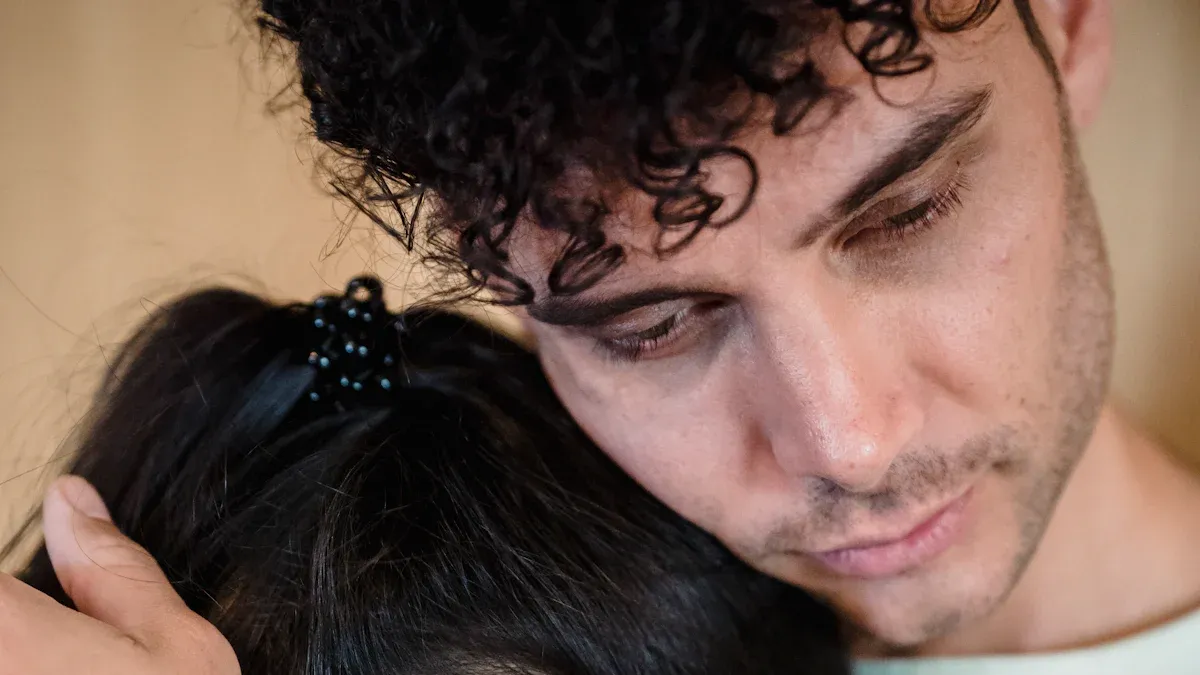You want closer and more meaningful connections. Learning how to be emotionally available helps you build trust and creates space for genuine closeness. Studies show that men who share their feelings and listen attentively develop stronger bonds and enjoy better mental health. Understanding how to be emotionally available allows you to improve your relationships. Being open with your emotions is not a sign of weakness; it is a sign of strength and growth. You can change, and each step you take brings you closer to the connection you desire.
Key Takeaways
Being emotionally available means you share your feelings honestly. You also listen carefully to others. This helps build trust and closeness.
Sometimes, culture and past experiences make it hard to open up. But if you notice these problems, you can start to grow.
Begin by paying attention to your feelings. Try to question old ideas. Practice being a little vulnerable each day.
Good communication and empathy are important. Taking responsibility also makes relationships stronger. This helps you feel closer to others.
Spend good time with people you care about. Show them affection and be patient. These things help you build strong, loving bonds that last.
Emotional Availability

What It Means
Emotional availability means you are there for your partner with your heart and mind. You listen and share feelings to help build trust. This helps make a safe space for both of you to talk about thoughts and emotions.
You help your partner grow and be independent.
You do not act rude or get in the way.
You talk about your own feelings and thoughts.
You face hard talks and do not ignore your partner’s feelings.
Mental health professionals say emotional availability has some important parts:
You stay open and try to understand emotions.
You share deep feelings and let yourself be vulnerable.
You are real and do not judge yourself too harshly.
You give support when things are good or bad.
You say sorry and admit when you make mistakes.
You care about conversations and pay attention.
You respect boundaries and show affection the right way.
You handle your own feelings and show empathy.
Tip: Emotional availability does not mean being perfect. It means being honest, real, and ready to grow.
Why It Matters
Being emotionally available helps you feel happier in your relationships. You build trust and help everyone feel safe. Studies show couples who share good feelings and support each other have stronger relationships. These good connections help your mind and body stay healthy. Over time, emotional availability brings more happiness and can help you live longer. When you choose to be emotionally available, you help make your relationship full of trust, warmth, and joy that lasts.
Barriers for Men

Cultural Expectations
You face strong cultural pressures that tell you to hide your feelings. Society often repeats the message that “boys don’t cry.” This idea comes from old beliefs about masculinity. You may feel you must act tough, never show weakness, and always stay in control. These rules teach you to keep emotions inside. Many people see vulnerability as a sign of weakness, not strength. You might hear that men should be dominant, emotionless, and always the breadwinner. These expectations make it hard for you to open up, even when you want to.
Note: These stereotypes do not help you. They limit your freedom and can hurt your mental health. When you challenge these ideas, you give yourself permission to feel and connect.
Past Experiences
Your childhood shapes how you handle emotions today. If you grew up with parents or caregivers who did not show love or talk about feelings, you may have learned to hide your own. Early neglect or trauma can make you fear closeness or trust. You might have built walls to protect yourself from pain. These habits are not your fault. They are survival skills you learned as a child.
Attachment theory explains that men with anxious or avoidant attachment styles often struggle with emotional closeness. You may find it hard to trust others or share your true self. These patterns can change, but first, you need to notice them.
Emotional Habits
You may have developed habits that keep you distant. Focusing too much on work, avoiding tough conversations, or keeping your feelings to yourself can all block emotional connection. Sometimes you check emails late at night or skip small acts of love, like giving compliments or hugs. These habits can make your partner feel ignored or unimportant.
You may keep relationships on the surface to protect yourself.
You might not even notice these habits because they feel normal.
Tip: You can break these habits. Start by noticing them and making small changes. Each step brings you closer to real connection and happiness.
How to Be Emotionally Available
Self-Awareness
You cannot change what you do not notice. Self-awareness is the first step in learning how to be emotionally available. When you understand your moods and how they affect others, you can respond with care instead of reacting out of habit. Start by naming your emotions as they happen. Ask yourself, “What am I feeling right now?” Stay present with tough feelings. Do not run from them. Explore your emotions with curiosity. Remember, emotions are not good or bad—they just are.
Here are some ways to build self-awareness:
Notice and name your emotions as they come up.
Stay with difficult feelings instead of pushing them away.
Explore your emotions without judging yourself.
Separate your thoughts from your feelings.
Share your emotions with people you trust, even if it feels scary.
Practice expressing your feelings, and seek help if you need it.
Journaling helps you track your moods and patterns. Set aside a few minutes each day to write about your feelings. You do not need perfect grammar. Just be honest. This practice helps you see your growth over time.
Tip: Support groups or male friendships can give you a safe place to practice self-awareness and get feedback.
Challenging Beliefs
Old beliefs about masculinity can block your path to emotional openness. You might think showing emotion makes you weak. These beliefs are not true. You can challenge them and learn how to be emotionally available.
Try these steps:
Ask yourself where these beliefs came from.
Look for evidence that proves these beliefs wrong.
Replace old beliefs with new, positive ones.
Use daily affirmations to remind yourself of your new mindset.
Share your journey with friends or a counselor.
Journaling is a powerful tool here. Use prompts like, “What belief about emotions holds me back?” or “How would my life change if I let go of this belief?” Over time, you will see that emotional expression is a strength, not a weakness.
Note: You do not have to do this alone. Trusted friends, family, or a therapist can help you break free from limiting beliefs.
Practicing Vulnerability
Vulnerability is the heart of how to be emotionally available. It means letting others see your true self, even when you feel scared. Start small. Share a personal story or a fear with someone you trust. Notice how it feels to be open.
Try these exercises:
Sit with your partner and make eye contact. Take turns sharing what you notice or feel in the moment.
Share something you are afraid to say. Use fear as a guide to deeper connection.
Use “I” statements, like “I feel nervous when…” to express yourself clearly.
Set a timer so both people have equal time to share.
Mindfulness practices like meditation or yoga can help you sit with uncomfortable feelings. Therapy also offers a safe space to practice vulnerability.
Callout: Vulnerability builds trust and brings you closer to others. Each time you open up, you grow stronger.
Communication Skills
Good communication is key to how to be emotionally available. You need to talk about your feelings and listen to others. Make emotions a normal topic in your conversations. Ask your partner how they feel. Share your own feelings, both good and bad.
Here are some skills to practice:
Expand your emotional vocabulary. Learn new words for feelings.
Notice how your body feels when you have strong emotions.
Accept that you have a rich inner life, even if you learned to hide it.
Reflect on your emotions through journaling or talking with a friend.
Admit mistakes and ask for support when you need it.
Tip: Honest and open communication helps you and your partner feel safe and understood.
Empathy and Active Listening
Empathy means seeing things from another person’s point of view. Active listening shows you care. When you listen without interrupting, you help others feel safe and valued. This is a big part of how to be emotionally available.
Benefit | How It Helps You Connect |
|---|---|
Builds Trust | Shows your partner you value their feelings |
Creates Safe Spaces | Makes it easier for others to share openly |
Resolves Misunderstandings | Prevents confusion and hurt feelings |
Strengthens Relationships | Deepens your emotional bond |
Encourages Empathy | Helps you understand and support your partner |
Empathy training helps you connect with your own emotions first. This makes it easier to understand others. Practice listening with your full attention. Repeat back what you hear to show you understand. Ask, “How can I support you right now?” Avoid jumping in with solutions. Sometimes, your partner just wants to feel heard.
Reminder: Active listening and empathy make your relationships stronger and more loving.
Taking Responsibility
You must own your feelings and actions. Taking responsibility is a core part of how to be emotionally available. Notice your triggers and patterns. Reflect on how your actions affect others. If you make a mistake, admit it and say sorry. This builds trust and shows you care about the relationship.
Self-reflection and therapy can help you understand your pain points. When you take responsibility, you create space for deeper connection. You show your partner that you are invested in the relationship.
Tip: Owning your emotions helps you communicate better and be more present with your loved ones.
Setting Boundaries
Healthy boundaries protect your well-being and your relationships. Knowing how to be emotionally available means knowing your limits and respecting others’ limits too. Boundaries help you avoid burnout and resentment.
Follow these steps to set boundaries:
Reflect on your needs and values.
Use “I” statements to share your boundaries calmly.
Pick a good time to talk about boundaries.
Be clear and specific about what you need.
Let others handle their own feelings about your boundaries.
Invite feedback from your partner to make sure you both understand.
Write down your points if you need help staying focused.
Adjust your boundaries as your relationship grows.
Note: Boundaries are not walls. They are bridges to healthy, lasting connection.
You can practice how to be emotionally available every day. Try journaling, meditation, or joining a support group. Spend quality time with your partner. Make their needs as important as your own. Take care of yourself, show gratitude, and learn from your mistakes. When you do these things, you build trust, intimacy, and happiness in your relationships.
Building Stronger Connections
Affectionate Behaviors
You can show love by doing small things every day. These actions help your partner feel safe and important. When you plan dates and keep your promises, you show you care. Giving hugs, holding hands, and cuddling make you both feel close. Leaving your things at each other’s homes or meeting family and friends shows trust. It also shows you want a future together. You can also listen, share your feelings, and say sorry when needed. These things show you are present and want a real relationship.
Plan and keep regular dates
Share physical affection, like hugs or holding hands
Introduce your partner to friends and family
Spend time on bonding activities
Talk openly about your feelings
Tip: Make sure your actions match your words. Doing what you say builds trust and shows you care.
Quality Time
Spending good time together makes your bond stronger. When you put away your phone and pay attention, your partner feels special. Listen carefully and share stories with each other. Try new things together, like cooking or walking outside. These moments help you make happy memories and get closer. Having regular date nights or simple habits, like morning coffee, keeps you close. Do not cancel plans or do other things at the same time, because it can hurt your partner’s feelings.
Be fully present during conversations
Plan fun activities you both enjoy
Set aside time each week for just the two of you
Create small rituals, like a weekly movie night
Callout: Quality time is not about what you do. It is about showing your partner they are important to you.
Patience and Growth
Building a strong relationship takes time and patience. You will have hard times and make mistakes. When you stay calm and let your partner grow, you build trust. Patience helps you accept each other’s flaws and learn from mistakes. It also helps you listen and be kind. Over time, patience helps you grow as a person. You become more caring and helpful. This growth makes your relationship deeper and more loving.
Take a deep breath before reacting in tough moments
Give your partner time to share their feelings
Celebrate small steps and progress
Learn from setbacks and keep moving forward
Note: Patience and growth help love grow strong. Your steady support helps both of you become better together.
You can make your relationships better by being emotionally available. When you talk about your feelings and listen with care, you build trust. This helps you and your partner feel closer. Studies show that being open with emotions helps you talk better and fight less. Both people feel happier in the relationship.
Begin by paying attention to your feelings.
Question old ideas about what it means to be a man.
Try new ways to connect with others each day.
Remember, this takes time. Every step you take helps you get closer to real connection and long-lasting happiness.
FAQ
How can you start being emotionally available if you never learned how?
Begin with small steps. Notice your feelings each day. Write them down in a journal. Share one feeling with a trusted friend. You will get better with practice.
Tip: Every step counts. You can change your habits.
What if you feel scared to open up?
Feeling scared is normal. Start by sharing a little at a time. Choose someone you trust. Remind yourself that vulnerability builds strong connections.
Take a deep breath
Speak honestly
Celebrate your courage
Can you be emotionally available and still set boundaries?
Yes, you can. Setting boundaries shows respect for yourself and others. Tell people what you need. Listen to their needs too. Boundaries help you stay healthy and connected.
How do you know if you are making progress?
You notice you share your feelings more often. You listen better. Your relationships feel closer. People trust you more.
Note: Progress takes time. Keep going and celebrate small wins.



Pingback: What to do during the talking stage in a relationship
Pingback: What Is a Situationship and How Does It Differ from a Relationship
Pingback: Understanding Ghosting and Its Impact on Relationships
Pingback: How to Connect on a Deeper Level with Your Partner